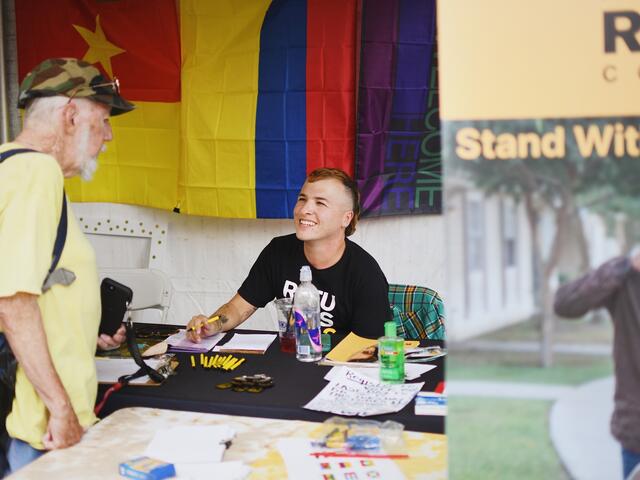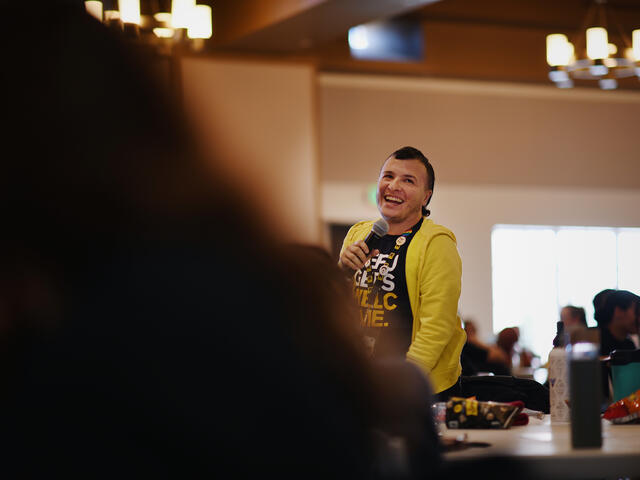Connection to their roots
As the child of former refugees, who left the Soviet Union along with hundreds of thousands of others in the 1980s, Dax (‘Dan-Knee’) whose pronouns are they/them, has always felt connected to immigrant communities growing up in Philadelphia. “As a kid, I have straddled that line to not always be stuck in the American-centric space,” they shared.
Curious about the world around them, and after obtaining a graduate’s degree in Political Science, they were given an opportunity to teach abroad in different countries – such as Greece, where they taught refugees and young adults English at a youth center. “That was a way in which I was able to first fund my ability to get around and see things and through that, I found a passion for education and for teaching,” they expressed.
Fun Fact
Did you know?
Dax has traveled to 77 countries! Their top three favorite countries so far have been:
- India
- Eswatini
- Mexico
Even before moving back to the United States, Dax had hopes of working at the International Rescue Committee (IRC) and had been applying for roles in different IRC locations. They moved to Tucson with a job at hand, not realizing there was an IRC office here.

Chance encounter
While Dax was in Tucson, they interned with a local church where they supported the migrant receiving program. Through this internship, they came to know about an immigration meeting with Arizona Senator, Kyrsten Sinema’s office and wanted to take part in it.
They asked the pastor, “can I still go to this immigration round table with Kyrsten Sinema? I have things I want to talk about.” It was at this meeting where they met IRC Arizona’s Executive Director, Aaron Rippenkroeger.
And as fate would have it, the morning right before the round table discussion, Dax had an initial interview with the IRC in Tucson. “The way I actually met some IRC leadership for the first time was the same day I had an interview screening for my first IRC interview ever!”
Weeks later, they were offered the role of an Employment Specialist. In this position, they worked with newly arrived refugees to guide them through the employment process to become self-sufficient.
After a year and half, Dax transitioned out of that role, and is now the Refugee Cash Assistance Coordinator. “On a month-to-month basis I make sure people are eligible and are being paid on time, which both of those seem basic, but due to systems can be quite nightmares,” they shared.
Public Private Partnership Program
The IRC works in over 40 countries with 20 resettlement offices across the United States. Staff, who come from diverse backgrounds, come together to provide support, and empower refugees. The IRC in Tucson has over 15 different programs, which aim to aid newly arrived clients with short-term and long-term needs. The Public Private Partnership (PPP) program is implemented by government offices in some states but recently transitioned to nonprofit partners in Arizona, “Before I came into this role, there was advocacy in different states, not only in Arizona, for the program to be brought internal since we understand refugee populations, and we know how to work with refugee clients,” Dax shared.
The PPP program was integrated into the IRC Tucson office in June 2021. When Dax first started the role, they were the only individual hired for the program. “We were given the opportunity to build the program from the ground up ourselves,” Dax said. The program offers financial assistance for those who qualify for up to a year after their arrival in the U.S. “They can pay their rent with it. They can buy toiletries and things like that,” they added.
Given the benefits of this program, it can be surprising that many people are not aware that they qualify for it. Those who qualify must be above the age of 18 with no dependents, and still within their first year of arrival within the U.S – “the clock starts the moment [they] arrive,” Dax said.
There has been an ongoing effort to share information with local communities to ensure that those who qualify can enroll and receive support. “The biggest impact has just been connecting underserved populations to the benefits that they qualify for…because there are many individuals who do qualify,” Dax explained.
75% of Dax’ clients currently are Cuban and when they think about the RCA program in the future, they would like to extend its reach to everyone who is eligible that can benefit from this vital assistance.

Reflection
It’s been three years and counting since Dax first joined the team, and they have enjoyed their time working with clients and their colleagues. “I love how multicultural it is – I also like that there is a growing number of people who feel safe and comfortable, to use pronouns that are non-binary,” they said.
The IRC extends near and far, and Dax appreciates the opportunities to collaborate with and learn from staff all over the world. “Having co-workers not only in my physical space but especially thanks to Covid, feeling like I’m in an office of thousands across the world!” they expressed.
Dax’s efforts and persistence in advocating for their clients within the PPP program has been helpful for the team. “I really appreciate that the program exists and that it does give people just direct cash -- it can at least help a little bit to get people on their feet,” they expressed. Thank you, Dax, for all your contributions. We are lucky to have you!